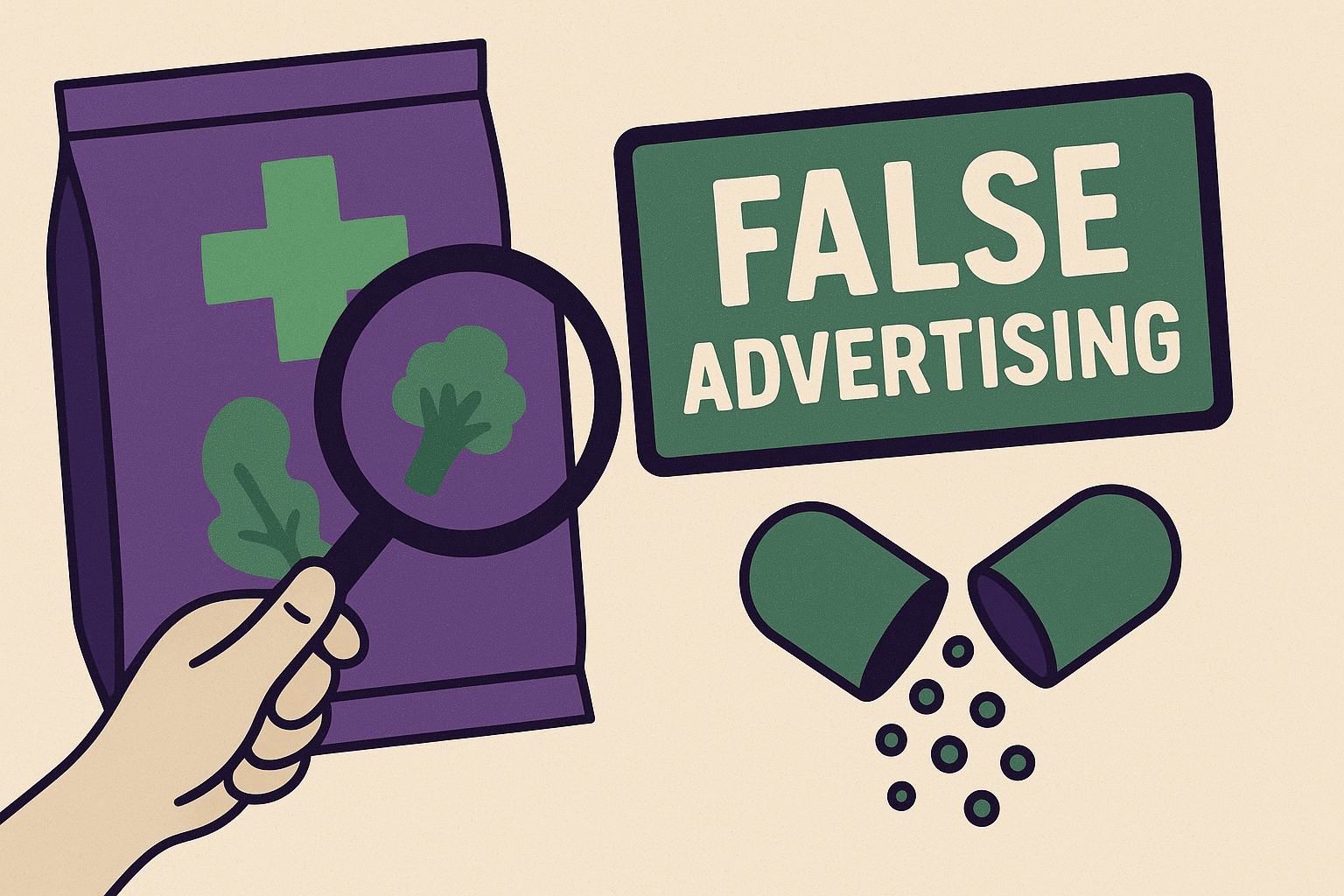False Advertising: Examples and Understanding
False Advertising is a no-go for brands that want to build a trustworthy relationship with their customer base. Thankfully, False Advertising is not as prevalent with major brands as it used to be. However, many small brands, especially online, will try to deceive their customers into purchasing a product or service that isn’t really what they’re advertising.
So what is False Advertising, and how can reputable brands avoid accidentally making a False Ad?
What is False Advertising?
Definition and Explanation of False Advertising
False advertising refers to the practice of making false, misleading, or deceptive claims about a product or service to persuade consumers to purchase it. This can include exaggerating the benefits or features of a product, making false claims about its performance or results, or hiding important information that might affect a consumer’s decision to buy. False advertising can take many forms, including print ads, television commercials, online ads, and even social media posts. For instance, a company might claim that their dietary supplement can lead to significant weight loss without any scientific evidence to back up such a claim. These false claims can mislead consumers, leading them to make purchases based on inaccurate information.
Importance of Understanding False Advertising
Understanding false advertising is crucial for consumers, businesses, and regulatory agencies. For consumers, being aware of false advertising practices helps them make informed purchasing decisions and avoid being misled by exaggerated claims. Businesses need to understand the laws and regulations surrounding false advertising to avoid engaging in deceptive practices that could damage their reputation and lead to legal consequences. Regulatory agencies, such as the Federal Trade Commission (FTC), play a vital role in enforcing advertising laws and protecting consumers from misleading claims. By understanding false advertising, these agencies can better identify and address deceptive practices, ensuring a fair marketplace for all.
False Advertising Claims
False advertising is a no-go for brands that want to build a trustworthy relationship with their customer base. Thankfully, false advertising is not as prevalent with major brands as it used to be. However, many small brands, especially online, will try to deceive their customers into purchasing a product or service that isn’t really what they’re advertising, misleading consumers and damaging trust.
So what is false advertising, and how can reputable brands avoid accidentally making a false ad?
What is False Advertising?
False advertising can be defined as the use of false or misleading information in order to advertise products or services to the public. A consumer’s ability to understand that an advertisement is misleading can be impaired by a number of factors, namely emotional states. Positive or gullible people are much more likely to fall victim to false advertising.
Advertisers that use fraudulent advertising will often make claims without citing sources, edit the appearance of their product to be completely different, or claim that a product has specific health benefits that are completely bogus. In the scope of health and fitness advertising, false advertising will often involve claiming a supplement can cure an illness or that a specific workout routine will change a person’s entire body composition. Some other common types of ad deception include:
- Photobleaching
- Leaving out crucial information
- Hidden fees and surcharges
- Manipulation
- Oversized packaging or some type of product filler
- Comparative ads
- Term manipulation
- Incomplete or inconsistent comparison
- Misleading graphics or photos
- Bait-and-switch
- Bogus guarantees
- Acceptance by default
Government organizations around the globe will regulate false advertising by enacting laws that make physical and digital false advertising illegal. A false advertisement can be classified as harmful and deceptive if there is proof that the advertiser deliberately misled consumers, rather than an honest slip-up or mistake.
It’s very easy to accidentally make a claim that isn’t truthful or create ads that are just a little too much on the side of fantasy. It’s so important for advertisers to properly check their ad campaigns for honesty and integrity.
Why False Advertising is Wrong and Why People are Often Fooled Into Ads
It’s quite easy for many people to fall for false advertising, especially if they tend to be lighthearted or easily fooled. Harder nuts to crack can even fall victim to an advertising campaign’s false claims if they are convincing enough.
False advertising is wrong because it’s essentially the act of scamming consumers into purchasing a product that will not give them the results promised in the ad campaign. It’s in poor taste, often illegal, and can ruin a brand’s reputation.
Luckily, most brands are catching on to the downfalls of false advertising. Consumers in today’s age are harder to manipulate and they are much more likely to withhold trust from companies. Because of this, brands are more interested in providing truthful and honest advertising in order to build a trustworthy relationship with their customers.
Healthy Ads is Dedicated to Honest Advertising Campaigns
At Health Ads, we don’t accept advertising campaigns or materials that make false claims or false promises. We believe that our clients are reputable brands who have the best intentions, and we’re happy to work with you! However, sometimes a less-than-honest comment or image will slip through the cracks.
It’s part of running a successful business– sometimes, a claim is made in poor taste without the brand advertisers even noticing that the content isn’t as truthful as it should be.
We’re happy to work with our advertisers to ensure that their content meets the mark and will gladly offer guidance to ensure that your banner, native, and videos ads meet our honesty standards for programmatic target advertising.
Definition and Examples
Deceptive advertising, also known as false advertising, refers to the practice of making false or misleading claims about a product or service to deceive consumers. This can include exaggerated claims, false statements, or omitting important information. Deceptive advertising can take many forms, including print, television, radio, and online ads.
Examples of deceptive advertising include:
- A company claiming that their product can cure a disease or improve a condition without scientific evidence to support the claim.
- A business comparing their product to a brand-name product without sufficient evidence to support the comparison.
- A company advertising a product as “Made in the USA” when it is actually made in another country.
- A company claiming that their product is environmentally friendly or sustainable when it is not.
These misleading claims can significantly impact consumer trust and lead to legal repercussions for the companies involved. It’s crucial for businesses to ensure their advertising is truthful and backed by credible sources to avoid falling into the trap of deceptive advertising.
Types of Deceptive Advertising
There are several types of deceptive advertising, each with its own unique tactics to mislead consumers:
- Unsubstantiated Claims: These are claims that lack support from scientific evidence or other credible sources. For example, a supplement company might claim their product can boost immunity without any clinical trials to back it up.
- Comparison Inconsistencies: This involves comparing a product to a brand-name product without sufficient evidence to support the comparison. For instance, a generic brand might claim their product is just as effective as a well-known brand without any comparative studies.
- Bait-and-Switch Tactics: This occurs when a company advertises a product as one thing but delivers something different. An example would be advertising a high-end laptop at a low price, only to switch the customer to a lower-quality model upon purchase.
- Green or Eco-Friendly Terms: Companies might advertise their products as environmentally friendly or sustainable when they are not. This is often referred to as “greenwashing.”
- Made in the U.S.A Claims: This involves claiming that a product is made in the United States when it is actually manufactured in another country.
Understanding these types of deceptive advertising can help consumers make more informed decisions and protect themselves from misleading claims.

Examples of False Claims
There are many examples of false claims in advertising that have caught public attention. Some famous cases include:
- Volkswagen’s “clean diesel” scandal: Volkswagen falsely advertised their diesel vehicles as environmentally friendly, claiming they met emissions standards when, in fact, they had installed software to cheat emissions tests.
- Red Bull’s energy drink claims: Red Bull claimed that its energy drink could improve physical performance and reaction time, which was found to be unsubstantiated. This led to a class action lawsuit and a settlement where affected consumers received significant financial compensation.
- L’Oréal’s skincare products: L’Oréal advertised that its skincare products could “boost genes” and provide anti-aging benefits. These claims were found to be deceptive as they lacked scientific evidence to support them.
Famous Cases of False Advertising
- Kellogg Company’s Frosted Mini-Wheats: Kellogg claimed that its Frosted Mini-Wheats cereal could improve children’s attentiveness by nearly 20%. This claim was found to be unsubstantiated, leading to a settlement where Kellogg agreed to pay $4 million to affected consumers.
- Skechers USA, Inc.’s Shape-ups: Skechers claimed that its Shape-ups shoes could help consumers lose weight and improve their physical fitness. These claims were found to be deceptive, resulting in a $40 million settlement with the FTC.
- Johnson & Johnson’s Baby Powder: Johnson & Johnson advertised its Baby Powder as safe and effective, despite evidence that it contained asbestos and could cause cancer. This led to numerous lawsuits and significant financial compensation for affected consumers.
These cases demonstrate the importance of understanding false advertising and the need for businesses to be truthful and transparent in their marketing practices. By avoiding false claims and adhering to ethical advertising practices, companies can build consumer trust and maintain their brand’s credibility.
Consequences of False Advertising
The consequences of false advertising can be severe and far-reaching:
- Legal Action: The Federal Trade Commission (FTC) can take legal action against companies that engage in deceptive advertising practices. This can include lawsuits and injunctions to stop the false advertising.
- Financial Penalties: Companies found guilty of deceptive advertising can face significant financial penalties. These fines can be substantial and impact the company’s bottom line.
- Damage to Reputation: Deceptive advertising practices can severely damage a company’s reputation. Once consumer trust is eroded, it can be challenging to rebuild.
- Loss of Business: Engaging in deceptive advertising can lead to a loss of business and revenue. Consumers are likely to take their business elsewhere if they feel they have been misled.
These consequences highlight the importance of maintaining ethical advertising practices and ensuring all claims are truthful and substantiated.
Avoiding False Claims
To avoid making false claims, companies should take several proactive steps:
- Ensure Scientific Evidence: All advertising claims should be supported by scientific evidence or other credible sources. This helps to substantiate the claims and build consumer trust.
- Avoid Exaggeration: Companies should avoid making exaggerated or unsubstantiated claims. It’s better to under-promise and over-deliver than to make promises that can’t be kept.
- Disclose Risks: Clearly disclose any potential risks or side effects associated with a product. Transparency is key to maintaining consumer trust.
- Regular Reviews: Regularly review and update advertising claims to ensure they remain accurate and truthful. This helps to avoid any outdated or misleading information.
- Involve Stakeholders: Involve major stakeholders, such as legal and compliance teams, in reviewing marketing materials. This ensures that all advertising is compliant with relevant laws and regulations.
By following these steps, companies can create honest, impactful campaigns that maintain their brand’s credibility and foster consumer trust.
Policing False Advertising
In the US, the Federal Trade Commission (FTC) plays a crucial role in policing false advertising practices in the United States. The FTC:
- Enforces Laws: Enforces truth-in-advertising laws and regulations to ensure that companies do not engage in deceptive advertising practices.
- Investigates Practices: Investigates and prosecutes deceptive advertising practices. This includes taking legal action against companies that violate advertising laws.
- Consumer Reports: Accepts reports from consumers on deceptive advertising practices. This helps the FTC identify and address false advertising issues.
- Guidance to Businesses: Provides guidance to businesses on how to avoid deceptive advertising practices. This includes resources and best practices for creating truthful and compliant advertising.
In addition to the FTC, other regulatory bodies and industry standards organizations also play a role in policing false advertising practices. These organizations work together to ensure that advertising remains truthful and that consumers are protected from misleading claims.
By understanding the role of these regulatory bodies, companies can better navigate the complex landscape of advertising laws and maintain ethical advertising practices.









